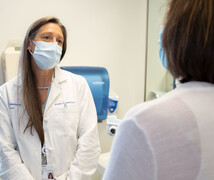If you have a uterus and ovaries, you will experience menopause when your ovaries no longer produce eggs or hormones. Wondering when menopause will start, how long it will last, and when to seek medical care? Here, Dr. MargEva M. Cole, MD, a Duke Health certified menopause specialist answers common questions about menopause.
When does menopause start?
Menopause takes place over time, bringing about changes in your menstrual cycle before your cycle completely stops. This time frame is often referred to as menopausal transition or perimenopause. Most people start perimenopause in their late 40s.
You officially reach menopause after you haven’t had a period for one year. On average, Dr. Cole said people typically reach menopause between ages 51 and 52, but that varies from person to person. Menopause that occurs before age 45 is considered early menopause. Menopause that occurs before age 40 is called premature menopause.
How do I know I’m experiencing perimenopause?
“Early on, people may notice changes in their cycles, like shorter cycles, irregular cycles, heavier periods, or more premenstrual syndrome (PMS) symptoms,” said Dr. Cole. You may also experience hot flashes, night sweats, mood changes, or sleep disturbances due to hormonal changes in your body.
Symptoms of perimenopause and the severity are different for everyone. “Some people have very minor symptoms -- they just wake up one morning and realize they haven't had a period for six months or more,” Dr. Cole explained. “Others experience mild hot flashes or night sweats, but it's really never a problem. Others struggle with irregular periods or symptoms like hot flashes or vaginal dryness,” she said.
How long does menopause last?
Hot flashes and other more intense symptoms that accompany perimenopause can last for six months to two years. You may still experience symptoms once you’ve gone a full year without a period and officially reach menopause. Those symptoms are typically milder, like flushing. Menopause is only one point in time, which occurs after you've gone a full year without a menstrual cycle. After that, you are considered postmenopausal for the rest of your life.
When should I see a provider about menopause?
It’s important to reach out to a provider when menopausal symptoms interfere with your quality of life or if you have questions, Dr. Cole said. “I’ve seen people wait the whole year until their annual exam with their gynecologist, and they’ve just struggled through when they don’t have to,” she said. Additionally, contact your provider immediately if you experience vaginal bleeding after you’ve gone a full year without a period.
What are my treatment options for menopausal symptoms?
Hormone replacement therapy (HRT) is the “gold standard” treatment, and Dr. Cole said most people will experience relief within two to four weeks of starting it. However, if you prefer not to use HRT, “there are many effective strategies to help manage your menopausal symptoms that don’t involve hormone replacement therapy,” she said.
Non-medical interventions include self-care and stress reduction, strategies for improving sleep, and changes to diet and exercise. There are several non-hormonal medications that can help reduce brain fog, chronic pain, and hot flashes. “A brand-new category of medication called neurokinin 3 inhibitors works on temperature regulation in the brain to suppress hot flashes,” she explained.
Who should I see for help with my menopause symptoms?
Your primary care provider or your obstetrician-gynecologist can help you. “Reach out to the provider you feel most comfortable with,” said Dr. Cole. They can refer you to a menopause specialist when needed.





